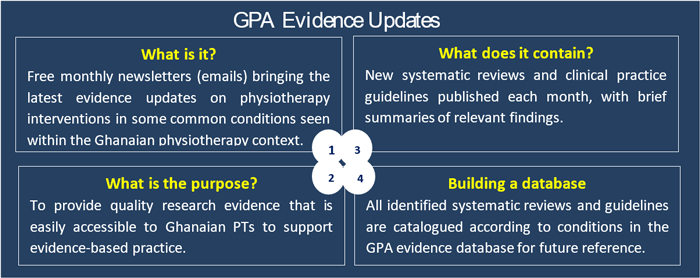Partnering to promote evidence-based physiotherapy in Ghana: creating Ghana Physiotherapy Association evidence updates
Introduction
‘…Evidence-based practice (EBP) is the integration of best research evidence with clinical expertise and patient values in the process of decision making related to patient health care.’1 EBP guides and improves patient care, and facilitates shared decision-making between health professionals, patients and the community. Over the years, recognised institutions like Cochrane, JBI and Campbell Collaboration have made giant strides in promoting and supporting evidence-based healthcare globally. Despite such commendable efforts, there are still some under-served regions across the globe, particularly in low- and middle-income countries, such as Ghana.
In the physiotherapy field, our mother organisation, World Physiotherapy, recognises EBP as a core mandate and an opportunity for professional development. Indeed, World Physiotherapy sees EBP as our moral duty to patients and encourages all physiotherapists (PTs) to be evidence-based practitioners. In Ghana, most PTs are aware of EBP but there is less reliance on it because PTs lack the understanding and the necessary skill set to fully engage in it. One common reason for a lack of engagement in EBP is that there is ‘limited access to databases’. For many, the concept is often misconstrued to mean the use of only research evidence to inform practice. Hence, the limited access to databases and subscription journals for published research often shoulders the blame for lack of engagement in EBP. Awareness of the other two equally relevant components of EBP – expert opinion and patient views – is usually lacking.
Idea conception
As I am passionate about evidence-based health care, I took on the personal project of developing an EBP resource to support Ghanaian PTs’ engagement in EBP. Although feasible in concept, I anticipated challenges with implementation and uptake of the resource due to PTs’ limited knowledge of EBP. The questions for me were how can:
1. quality evidence be made easily accessible to Ghanaian PTs to inform practice?
2. Ghanaian PT clinicians have access to databases?
3. EBP culture be promoted amongst Ghanaian PTs?
The idea
The ultimate goal was to promote the EBP culture amongst Ghanaian PTs, but the first step was to create an initiative to circumvent the issue of ‘limited access to databases’. My idea was to create an easily accessible and readily available resource of quality evidence for PTs to support practice. The vision was to produce a one-stop-shop evidence resource within the reach of PTs, similar to what was done within the Centre for Evidence Based Hand Surgery, UK. My planned approach was to use the literature review method to summarise the best evidence on some common conditions seen within the Ghanaian context into a newsletter for PTs. The plan was to develop the first newsletter to bring the idea to light, evaluate the feasibility of its creation, explore its potential uptake by colleagues and, later, put together a research group to support its monthly production.
The proposed content of the newsletter was:
- brief evidence summaries of the best evidence
- best evidence referring to systematic reviews of randomised controlled trials of intervention effectiveness and clinical practice guidelines on physiotherapy/rehabilitation
- evidence summaries containing hyperlinked titles to abstracts (and full articles if available), results and conclusions of the studies to help inform clinical decision-making
The aim was to distribute the newsletter by email to all PTs or host it on a website.
The partnership
As a patient public involvement expert, I appreciate the importance of engaging and seeking the views of stakeholders in project planning, and for this initiative, my key stakeholders were the Ghanaian PTs (clinicians, researchers and national physiotherapy association executives). In this regard, I tested the above ideas with two PT colleagues: Mary Wetani Agoriwo (clinician, assistant lecturer) and Cosmos Yarfi (assistant lecturer and researcher). I was keen to know what their thoughts were, whether the planned initiative was a meaningful venture and whether it was feasible and achievable in Ghana. The feedback was generally positive and both PTs saw the relevance of the proposed initiative and potential benefit on physiotherapy care. Mary anticipated the magnitude of the task and suggested implementation on a pilot basis at the institutional level with a later scale-up to my proposed national level. Cosmos, who also doubled as a national association executive, assured me of the association’s commitment to provide both professional and technical support for implementation. And this was the beginning of the partnership between me and the Ghana Physiotherapy Association (GPA).
This partnership birthed the two Ghanaian physiotherapy EBP initiatives: GPA Evidence Updates and GPA evidence database. Both initiatives were lunched on 13 March 2022 with the publication of the first edition of the newsletter. There were two main contributing roles:
1. I developed the search strategies, conducted the searches, compiled the findings and produced the first newsletter (February 2022 edition).
2. The GPA provided the platform (website, organisational group emails) to host the initiatives and the human resource (information technologist) to support its implementation and continuous operation (under the leadership of Dr Paul Amankonah, GPA president).
Snapshot of what we created

Impact
One of the outputs of this partnership is the creation of the EBP research group within the national association, GPA. As hinted above, part of the vision was to constitute a research group to support the monthly production of the newsletters as part of a bigger aim, which is to promote EBP culture amongst Ghanaian PTs through training and advocacy.
At the time of writing this blog (September 2022), the research group has published its seventh edition of GPA evidence updates (August 2022 edition). And, as part of the research group, I sincerely appreciate the efforts of all researchers working tirelessly each month to continue the vision. Together, we strive to bring EBP first to the doorstep of Ghanaian PTs and then to the global rehabilitation community.
Next steps
From my perspective as group lead, I believe the team has started off well and, with hard work and support, the future can only get better. As a young research group, the team is keen on advancing the other three areas of focus (research, training, and advocacy on EBP) and welcome any relevant partnerships and collaborations. Currently under our training arm, the team is planning its latest webinar on EBP sensitisation amongst Ghanaian PTs to celebrate this year’s World Evidence-Based Healthcare (EBHC) Day on 20 October 2022. From the stables of the Ghana EBP research group, we wish you all Happy World EBHC Day.
Take home messages
1. The power of networking and maintaining meaningful connections cannot be over-emphasised. This is key to pioneering partnerships, so let’s keep our networks alive!
2. Dare to dream, take steps and engage with the relevant collaborators. The possibilities are far greater through working in partnerships than working alone. After all, two heads, they say, are better than one.
Reference
1. Sackett D, Richardson W, Rosenberg, W, Haynes B, Straus S. Evidence based medicine: how to practice and teach EBM, 2nd edn. Oxford: Churchill Livingstone, 2000.
Acknowledgements
Many thanks to GPA EBP research team: Mary Wetani Agoriwo, Martin Ackah, Akua Afiriyie Bilson, Cosmos Yarfi, Adjoa Banson, Hosea Boakye.
Co-publication declaration
I declare that this story, or any parts of it has not been published elsewhere.
Twitter handles
1. @Bea_Sankah
2. @GPA_GhanaPhysio
Authors
Beatrice E.A. Sankah1, Mary Wetani Agoriwo2, Cosmos Yarfi3.
1. University of Southampton, UK
2. University of Health and Allied Sciences, Ghana; Stellenbosch University, South Africa
3. University of the Western Cape, South Africa; University of Health and Allied Sciences, Ghana
Disclaimer
The views expressed in this World EBHC Day Blog, as well as any errors or omissions, are the sole responsibility of the author and do not represent the views of the World EBHC Day Steering Committee, Official Partners or Sponsors; nor does it imply endorsement by the aforementioned parties.
